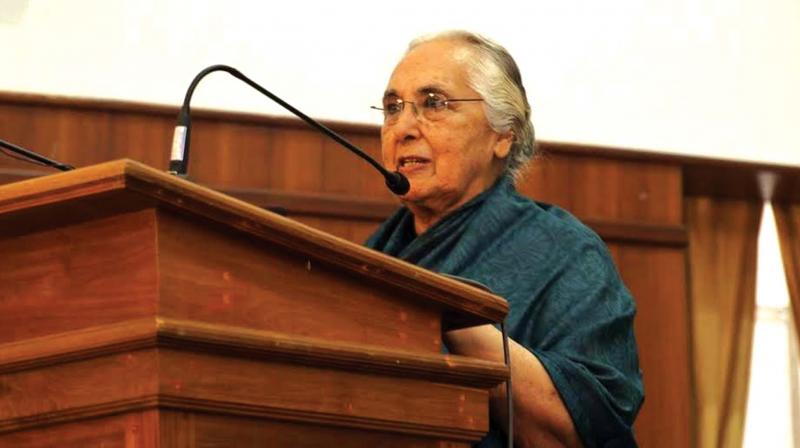Romila Thapar and JNU: Can India’s Left go to the rescue?

Najman Bua’s story about the defiant tamarind leaf resurfaced in one’s thoughts the other day. We learnt last week of a malodorous decision taken by Delhi’s Jawaharlal Nehru University (JNU), currently run by right-wing obscurantists, handpicked by the Modi government. They have asked eminent historian Romila Thapar, 87, for her CV to see if she could continue as professor emerita at the history faculty where she is revered as a teacher and scholar of amazing intellectual prowess. As enormities of academic and intellectual outrage go, which Hindu fascists are capable of inflicting at will now, this was at best an irritating indiscretion. Thapar is not expected to yield an inch, as she and her fellow scholars have endured the slings and arrows of the growing intellectual intolerance in India for decades. She is a key target, yes, but not alone.
Scholars like Prof. Irfan Habib have fought their battles for democratic principles on several fronts, occasionally simultaneously. As the lodestar of the formidable history department he helped develop in Aligarh Muslim University, Habib, now a professor emeritus, has confronted Muslim bigotry, Hindu fanaticism and even rebukes from his chosen party, the CPI(M), often all together. The octogenarian opposed narrow Muslim demands in the 1970s to change the secular character of AMU. And we still remember the dark day when Habib was in tears, pleading with the media not to give credence to the canard that Hindu victims of communal riots were being poisoned at the varsity medical college. If anything, their lives were saved. Most demeaning of all, perhaps, as he continued to battle Muslim revivalism and Hindutva fascism, was that Habib found himself in the party doghouse for speaking out. On one occasion he was “isolated” for asking that West Bengal chief minister Jyoti Basu be allowed by the CPI(M)’s central committee to become Prime Minister.
Early signs of right-wing intolerance surfaced in academia when, within months of the Janata Party coming to power in 1977, history textbooks of great merit were banned, including those written by Professor Thapar. Indira Gandhi to her credit had presciently described the anti-Congress JP Movement, packed with the Rashtriya Swayamsewak Sangh (RSS) activists, as fascist. Aware of the truer political reality, the pro-Soviet communists supported her assessment, and they were proved right when pro-Moscow Sheikh Mujibur Rahman was assassinated on Aug 15, 1975, three months into the Indian emergency, by right-wing military coup leaders in Dhaka. The post-Vietnam cat-and-mouse game of the superpowers had shifted to South Asia, and it was not too long before Z.A. Bhutto fell victim to another right-wing military coup.
To her “fascist” barb, Mrs Gandhi’s bête noire Jayaprakash Narayan retorted that if the RSS was fascist, then he too was one. The pro-China leftists led by the CPI(M) supported the JP Movement and saw their own chance in it. They began their record rule of West Bengal in the wake of the Janata Party victory. They unwittingly again helped the RSS in 1989 by joining hands with the Hindu right to shore up V.P. Singh’s short-lived premiership. The blunders may have something to do with today’s disturbing reality that the CPI(M) leadership is still not united in describing the Modi regime as fascist. Perhaps Mrs Gandhi was more far-sighted than them.
That the RSS rose from having two dismal BJP MPs in 1984 to 85 seats in the 1989 elections, not without the direct or indirect help of the CPI(M), is important to understanding the bind that India’s public intellectuals are in today. History students at JNU during and just after the emergency would remember how CPI(M) cadres hounded Marxist historian Bipan Chandra because he shared a worldview with comrades in the pro-Soviet camp. The party’s history of as yet unacknowledged blunders — a rankling one being the veto against Basu becoming PM — has played a hand in the rise of the Hindu right, and its concomitant anti-intellectualism. It is a saving grace that the CPI(M) supported the anti-lynching bill passed by the West Bengal Assembly and backed chief minister Mamata Banerjee for it. It may yet not be too late for the left to help Romila Thapar and her valiant colleagues to fight for India’s promised freedoms.
In the story of Premrani that Najman Bua told us several times many years ago, there was a tamarind tree that protected the princess when her seven brothers went hunting. The tree with magical powers towered over the mansion where the happy siblings lived. One day, evil bandits feigning to be her seven guardians knocked on her door. The tamarind tree alerted the princess with a song that the visitors were not her friends. As was the norm in Najman’s stories from Rudauli, located on a detour between Lucknow and Ayodhya, the tree would invariably sing its advice in Awadhi. “Premrani, Premrani khol de kewaarh, tohrey saaton bhaiyya aai gae bhorai dwaar.”
The frustrated bandits directed their anger at the interfering tree and chopped off one branch at a time. Finally, they killed the entire tree, but a tamarind leaf still survived and thwarted the bandits with her warning song. At the end of the story, the brothers arrived in time and overwhelmed the bandits. Had she been around, Najman Bua would have perhaps likened the tree to Nehru and Romila Thapar to the defiant tamarind leaf.
By arrangement with Dawn

